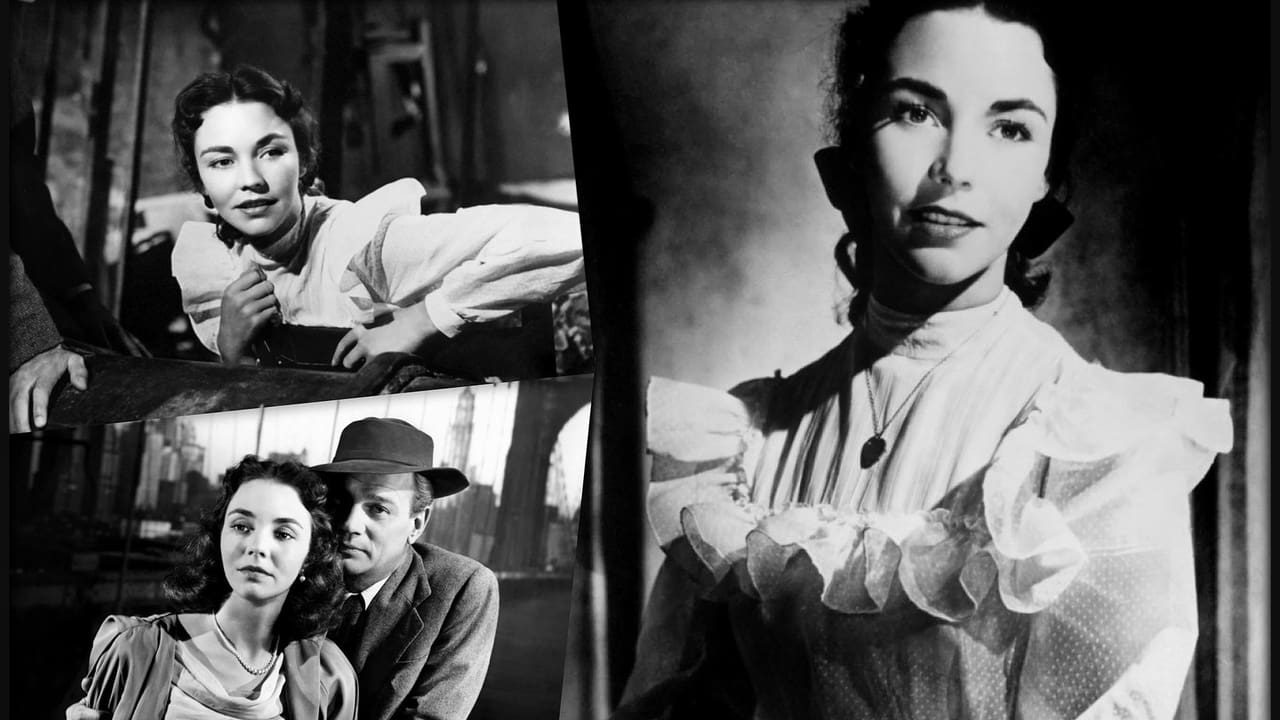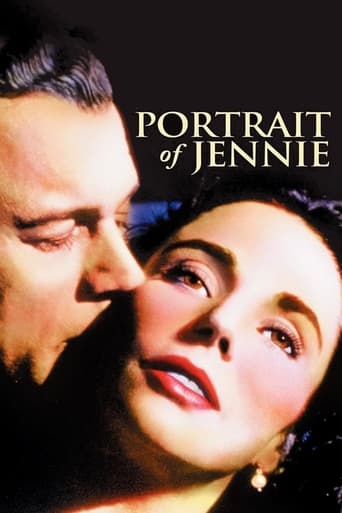



I think this is a new genre that they're all sort of working their way through it and haven't got all the kinks worked out yet but it's a genre that works for me.
View MoreOne of the worst ways to make a cult movie is to set out to make a cult movie.
View MoreUnshakable, witty and deeply felt, the film will be paying emotional dividends for a long, long time.
View MoreThrough painfully honest and emotional moments, the movie becomes irresistibly relatable
View MoreI first saw Portrait of Jennie when I was 8 years old (63 years ago) and have never forgotten it. Mesmerized me and I have always wanted to see it again. My daughter got me a copy on DVD as a surprise for Christmas which I am watching for the third time today. Beautiful love story.
View MoreEben Adams is a talented but struggling artist in Depression era New York who has never been able to find inspiration for a painting. One day, after he finally finds someone to buy a painting from him, a pretty but odd young girl named Jennie Appleton appears and strikes up an unusual friendship with Eben.The film is notable for Joseph H. August's atmospheric cinematography, capturing the lead character's obsession with Jennie, amongst the environs of a wintry New York. August shot many of the scenes through a canvas, making the scenes look like actual paintings. August, who used many lenses from silent film days, died shortly after completing the film. He was posthumously nominated for an Academy Award for Best Cinematography.The film does mark a milestone in fantasy film, which really didn't much exist in the earlier years so far as I can recall. The cinematography really does set it apart. The scenes where the background looks like canvas is just a brilliant idea, and has us questioning what is real and what is just a creation. Indeed, even by adding an opening narration, we are left with the impression that this is intended as a story (creation) rather than anything that could be considered reality.
View MoreThere is an element of magic to this story, which has a struggling artist (Joseph Cotten) meeting a young girl (Jennifer Jones) in the park by chance one day. It's soon apparent that there is something different about this girl, as she mentions things from decades ago as if they were current, and ages a little each time he subsequently meets her. A romance begins to develop, fueled by artistic inspiration she gives him, as well as mystery – is she a ghost? A muse? Someone only he can see? Meanwhile, tragedy lurks.The film is gorgeous, with beautiful shots of winter in New York City, and artistic effects such as those created by spreading canvas over the camera lens. The performances are reasonably good, and it was fantastic to see Ethel Barrymore and Lillian Gish in supporting roles. There is a dreamy feel to it, as well as philosophical message of the timelessness of art and love. It's intellectual, opening with deep thoughts ("Since time began man has looked into the awesome reaches of infinity and asked the eternal question: What is time? What is life? What is space? What is death?"), quotes from Euripides and Keats, and other profundity ("This was tomorrow once "). It's also quite romantic ("I know we were meant to be together. The strands of our lives are woven together and neither the world nor time can tear them apart"), and it may be too syrupy or cheesy for some viewers. I have to say that Director William Dieterle does lay it on pretty thick towards the end – but all in all, with aesthetic elements that touch the head and heart, I found it entertaining.
View MorePortrait of Jennie (1949)An ambitious, multi-layered, visually inventive misfire. It's not bad, and the leading actors are good or even great, including the supporting players. But there is so much striving for profundity and a failure to reach it you can't really get into the more compelling basic plot of a pretty girl from the past appearing as a vision to a lonely painter in New York. The fantasy as the core is a wonderful idea that struggles to be truly fantastic.I'm a sucker for romantic films. I thought I this would sink me. At first I went along with the quotes about love and the voice-over intoning and the clouds swirling. But soon the production values begin to show a wobbly. I liked the scenes of New York on a canvas texture as if a black and white painting. Some city shots are photographic stills, however, and you can see the grain of the original clearly motionless, and the segues between techniques are sometimes a bit clumsy.Even so, you get absorbed in Joseph Cotten's character. He's great. He's subtle and likable and restrained. The Jennie is a real Jennie, Jennifer Jones, who starts off playing a 13 year old with a minimum of conviction, then a 16 year old, and so on into her early 20s, where she can then radiate and be her real self at her best. (She was 29 during filming and that year married the producer, David Selznick.) Cotten and Jones don't quite have on-screen chemistry, but there is a long section just beyond halfway where the two are together romantically that is lovingly filmed. The tight close-ups of their two heads at night, in a moving shift of poses, is really great stuff and you finally really feel for the two of them.Without giving too much more away, it's really the crux of the film that Cotten is stuck in the present and Jennie keeps appearing to him--and only him, it seems--from the past. He's confused by this but enchanted (she's a pretty woman and a nice kid both) and his painting career takes off. She is the more complex character in a way because she's vaguely aware something is wrong . I wish they had given more time to her psychology, because there is a lot there under the surface.I feel like a curmudgeon having doubts about such a romantic film. It is an influence, no doubt, on the similar (and similarly flawed) "Somewhere in Time," though in "Jennie" we have a problem they never address of how Jennie doesn't quite notice that the cars are decades newer than she remembered. Most of the time they spend in the park or in the artist's garret, to avoid that hitch. There is a final technical surprise near the end which I won't say much about except that it's thrilling all around, with tinting of whole sequences like some 1922 dramatic silent. (The cinematographer, Joseph August, used some silent era lenses for many scenes, and got an Oscar nomination for his efforts.) The scenes by the end are wild and beautiful, and if you have gotten into their relationship for real by that point you'll be really moved. Throw in some lightly bastardized Debussy, quite beautiful, and you have true drama.Director William Dieterle deserves both credit for making this as different and fresh as it is and some criticism for not pulling it together more smoothly. I think it's because of Selznick, who stuck his nose into the production many times, and kept the vitals shifting as they went. Five writers were used (it shows, especially in redundant recollections of the sad-eyed Jennie throughout). And shooting on location, a novelty in the 1940s, added expense and perhaps some larger than expected challenges. Oh, look for silent era star Lillian Gish briefly as the main nun, and Ethel Barrymore in a major secondary role. There is a lot here to like, but as a total film it's weirdly imperfect, feeling almost unfinished.
View More